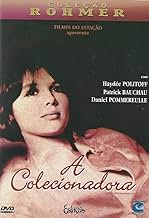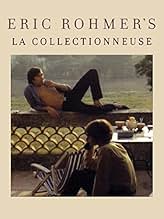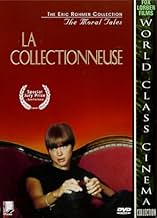CALIFICACIÓN DE IMDb
7.3/10
10 k
TU CALIFICACIÓN
Un comerciante de arte mujeriego y un pintor, ven perturbada la serenidad de sus vacaciones por una tercera invitada, una mujer bohemia conocida por su larga lista de conquistas masculinas.Un comerciante de arte mujeriego y un pintor, ven perturbada la serenidad de sus vacaciones por una tercera invitada, una mujer bohemia conocida por su larga lista de conquistas masculinas.Un comerciante de arte mujeriego y un pintor, ven perturbada la serenidad de sus vacaciones por una tercera invitada, una mujer bohemia conocida por su larga lista de conquistas masculinas.
- Dirección
- Guionistas
- Elenco
- Premios
- 2 premios ganados y 1 nominación en total
Mijanou Bardot
- Carole
- (as Mijanou)
Eugene Archer
- Sam
- (sin créditos)
Brian Belshaw
- Haydée's boyfriend
- (sin créditos)
Pierre-Richard Bré
- Homme dans l'auto
- (sin créditos)
Donald Cammell
- Garçon à St-Tropez
- (sin créditos)
Alfred de Graff
- Touriste perdu
- (sin créditos)
Opiniones destacadas
Two tired cliches are that sex destroys friendships and that men and women can never really be friends and no-one chronicled these two sayings better than Eric Rohmer who made it his life's work to explore the psychological battles that we call courtship. In doing so he became, perhaps, the cinema's greatest director of women. Let's forget for a moment that he divided his films into series, (Six Moral Tales, for example, of which "La Collectionneuse" is one), and concentrate on the film at hand.
"La Collectionneuse" is very simple and very straightforward. Two male friends spend a summer sharing a villa in the south of France. There is another occupant, a slightly younger woman who sleeps around and it is she the men christen the collector since she 'collects' men wherever she goes. They, of course, consider themselves moral but they are also intellectuals and perhaps womanisers, too. They want to collect the girl; they want the girl to collect them.
Like all of Rohmer's best work this is a film of talk rather than action. Rohmer doesn't film love scenes or sex scenes; once his male and female characters enter the bedroom he loses interest. It's the chase and not the catch he cares about and whether men and women really can be friends as well as lovers. He takes his subjects seriously but he also likes to have fun at their expense and like so many of his films "La Collectionneuse" will have you chuckling if not exactly laughing out loud.
In his later films it was usually the women who took the lead but here it is Adrien, (a superb Patrick Bauchau), who acts as our narrator, guiding us through the moral maze but then all three players are excellent. This may be a minor Rohmer film but minor only in the way a short story is considered minor when compared to a novel. Personally I think "La Collectionneuse" is a Rohmer crying out for your collection.
"La Collectionneuse" is very simple and very straightforward. Two male friends spend a summer sharing a villa in the south of France. There is another occupant, a slightly younger woman who sleeps around and it is she the men christen the collector since she 'collects' men wherever she goes. They, of course, consider themselves moral but they are also intellectuals and perhaps womanisers, too. They want to collect the girl; they want the girl to collect them.
Like all of Rohmer's best work this is a film of talk rather than action. Rohmer doesn't film love scenes or sex scenes; once his male and female characters enter the bedroom he loses interest. It's the chase and not the catch he cares about and whether men and women really can be friends as well as lovers. He takes his subjects seriously but he also likes to have fun at their expense and like so many of his films "La Collectionneuse" will have you chuckling if not exactly laughing out loud.
In his later films it was usually the women who took the lead but here it is Adrien, (a superb Patrick Bauchau), who acts as our narrator, guiding us through the moral maze but then all three players are excellent. This may be a minor Rohmer film but minor only in the way a short story is considered minor when compared to a novel. Personally I think "La Collectionneuse" is a Rohmer crying out for your collection.
La Collectionneuse is a fine example how consistent Eric Rohmer was throughout his Moral Tales series. The story isn't important here, its the intensity of each scene and the tension among the characters till the last scene. Subtle jump cuts in the storyline can make you pause & arrive at your own hypotheses about how the characters are feeling in the following scenes. This is a visual treat - whether its the sights & sounds of the reviera house where most of the movie takes place, or the shots of beach or Haydee Politoff's delicious lips. You never begin to hate or love any character at any point - but they stay on your mind long after the movie is over. The characters, adrian, haydee & daniel exude human rawness - none are perfect or simplistic. As a viewer, I could not take anyone's side. They all seek power in their own ways, while exposing their sensitivies equally. Its a curious caricature of the complexities around love and life. Rohmer uses symbols like antiques to express how the relationships are built and broken. I could watch it again & again. A delightful Rohmer classic - its poetic, with a pacing that works as a meditation of sorts.
A young man (Patrick Bauchau) parts with his fiancée to vacation in the south of France, where he plans to catch up with an old friend and spend his time in solitude. His holiday idyll is perturbed by the presence of a young woman (Haydée Politoff), who he says is not his type, but spends an awful lot of his time thinking about. She's sexually free and while in search of what she's looking for in life, sleeps with various men, a fact that gets under his skin.
The film is appealing aesthetically because through various small observational details in the surroundings and in the introspective silences he allows in, Éric Rohmer transports us to this place and its feeling. Politoff is also appealing to say the least, and her character has such an innocent simplicity about her that she's charming to watch. These are the things that made the film for me.
What I disliked about it was the protagonist, who provides the narration and the point of view of the film. While Rohmer is making a point about male insecurity and this guy's issues (as well as the other guy there, who's also an idiot), I have to say, he's so cold and judgmental that he's not likeable. I would have loved a version of this film that was made from Haydée's perspective. To its credit, through dialogue she is allowed to express her opinions, e.g. That he should mind his own business, and her boredom as he prattles on with his tedious pseudo-intellectualism. The art dealer also provides quite a takedown of the young man's not working and general laziness. He seems empty as a person and I suppose we're meant to recognize that and compare it to Haydée, who presumably goes off to Italy at the end and gets more enjoyment out of life. It's just unfortunate that the film, through its title and its narration, seems to share some of the viewpoint of the young man.
Overall, however, I liked this film both times I've watched it, and thought it was wisely kept at just 83 minutes. It makes me feel as though I was on holiday, and the images of Haydée Politoff are indelible.
The film is appealing aesthetically because through various small observational details in the surroundings and in the introspective silences he allows in, Éric Rohmer transports us to this place and its feeling. Politoff is also appealing to say the least, and her character has such an innocent simplicity about her that she's charming to watch. These are the things that made the film for me.
What I disliked about it was the protagonist, who provides the narration and the point of view of the film. While Rohmer is making a point about male insecurity and this guy's issues (as well as the other guy there, who's also an idiot), I have to say, he's so cold and judgmental that he's not likeable. I would have loved a version of this film that was made from Haydée's perspective. To its credit, through dialogue she is allowed to express her opinions, e.g. That he should mind his own business, and her boredom as he prattles on with his tedious pseudo-intellectualism. The art dealer also provides quite a takedown of the young man's not working and general laziness. He seems empty as a person and I suppose we're meant to recognize that and compare it to Haydée, who presumably goes off to Italy at the end and gets more enjoyment out of life. It's just unfortunate that the film, through its title and its narration, seems to share some of the viewpoint of the young man.
Overall, however, I liked this film both times I've watched it, and thought it was wisely kept at just 83 minutes. It makes me feel as though I was on holiday, and the images of Haydée Politoff are indelible.
The arrogant and pretentious intellectual art dealer Adrien (Patrick Bauchau) invites his girlfriend to travel with him to the coast to spend one month vacation with his close friend and painter Daniel (Daniel Pommereulle) in the house of their Randolphe. Adrien expects to do nothing but read and rest in the house and meet a possible investor in an art gallery that he dreams on having; however she prefers to travel to London. When he arrives, he discovers that the sexy and promiscuous pleasure-seeking Haydee (Haydée Politoff) that had one nightstand with Randolphe is sharing the house with Daniel. Along the days, Adrien becomes obsessed in a sick game of humiliating Haydee and imaging that she is trying to seduce him; however, his lust for her increases but his moral rationalization of their possible relationship keeps them apart.
"La Collectionneuse" is an erotic tale of arrogance, false value judgment and pretentious intellectuality of a false moralist. The witty and cynical screenplay uses excessive narrative in off of the unlikable lead character Adrien that is despicable as well as his friend Daniel. Actually, the only likable character is the libertine Haydee that accepts passively the cruel comments and treatment of Adrien and Daniel. Eric Rohmer uses the successful idea of a triangle of love with two men and a woman of "Jules et Jim" in a different and monotonous approach. My vote is six.
Title (Brazil): "A Colecionadora" ("The Female Collector")
"La Collectionneuse" is an erotic tale of arrogance, false value judgment and pretentious intellectuality of a false moralist. The witty and cynical screenplay uses excessive narrative in off of the unlikable lead character Adrien that is despicable as well as his friend Daniel. Actually, the only likable character is the libertine Haydee that accepts passively the cruel comments and treatment of Adrien and Daniel. Eric Rohmer uses the successful idea of a triangle of love with two men and a woman of "Jules et Jim" in a different and monotonous approach. My vote is six.
Title (Brazil): "A Colecionadora" ("The Female Collector")
Art dealer, in need of serenity, finds that the holiday villa is shared by a hedonistic young woman. He becomes obsessed with ignoring her and pretends to himself that she wants to seduce him while he remains unaffected. The holiday thus turns into a love triangle between the indifferent but flirtatious girl, the man's unacknowledged desire, and his incessant, pompous self-rationalizations (the best cinematic use of voice-over EVER!). A sunny, witty, and deeply ironic "moral tale" that explores, like most of Rohmer's work, the uneasy vacillation between intellect and eroticism.
¿Sabías que…?
- TriviaÉric Rohmer's first color film.
- ConexionesFeatured in Uuden aallon jäljillä (2009)
Selecciones populares
Inicia sesión para calificar y agrega a la lista de videos para obtener recomendaciones personalizadas
- How long is The Collector?Con tecnología de Alexa
- What are the names of all six of Rohmer's moral tales?
Detalles
- Fecha de lanzamiento
- País de origen
- Sitio oficial
- Idiomas
- También se conoce como
- The Collector
- Locaciones de filmación
- Côte d'Azur, Francia(coastal line and landscapes)
- Productoras
- Ver más créditos de la compañía en IMDbPro
Taquilla
- Total a nivel mundial
- USD 7,077
- Tiempo de ejecución1 hora 26 minutos
- Mezcla de sonido
- Relación de aspecto
- 1.37 : 1
Contribuir a esta página
Sugiere una edición o agrega el contenido que falta

Principales brechas de datos
What is the Japanese language plot outline for La collectionneuse (1967)?
Responda
![Ver Bande-annonce [OV]](https://m.media-amazon.com/images/M/MV5BMjA2ZGRjY2QtNmMzMy00MjE3LWI1YzUtZTZiZDQ5YzY0YWIxXkEyXkFqcGdeQXRyYW5zY29kZS13b3JrZmxvdw@@._V1_QL75_UX500_CR0)

























